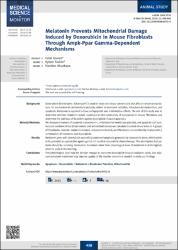Melatonin prevents mitochondrial damage induced by doxorubicin in mouse fibroblasts through Ampk-Ppar gamma-dependent mechanisms.
Citation
Guven C, Taskin E, Akcakaya H3. Melatonin Prevents Mitochondrial Damage Induced by Doxorubicin in Mouse Fibroblasts Through Ampk-Ppar Gamma-Dependent Mechanisms. Med Sci Monit, 2016; 22: 438-446. doi: 10.12659/MSM.897114Abstract
Background: Doxorubicin (brand name: Adriamycin®) is used to treat solid tissue cancer but it also affects noncancerous tissues. Its mechanism of cytotoxicity is probably related to increased oxidation, mitochondrial dysfunction, and apoptosis. Melatonin is reported to have antiapoptotic and antioxidative effects. The aim of this study was to determine whether melatonin would counteract in vitro cytotoxicity of doxorubicin in mouse fibroblasts and determine the pathway of its action against doxorubicin-induced apoptosis.
Material/Methods: We measured markers of apoptosis (cytochrome-c, mitochondrial membrane potential, and apoptotic cell number) and oxidative stress (total oxidant and antioxidant status) and calculated oxidant stress index in 4 groups of fibroblasts: controls, melatonin-treated, doxorubicin-treated, and fibroblasts concomittantly treated with a combination of melatonin and doxorubicin.


















